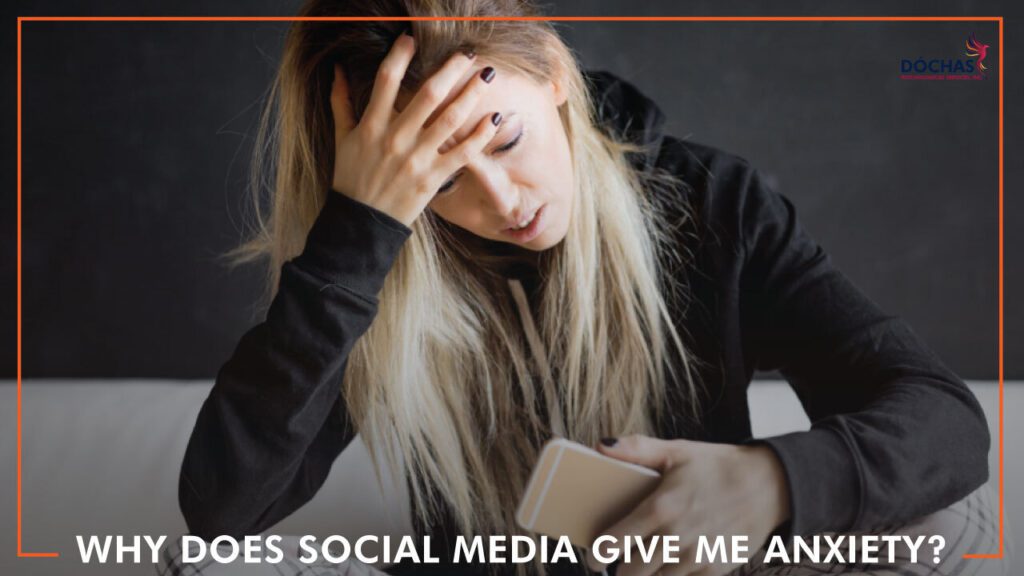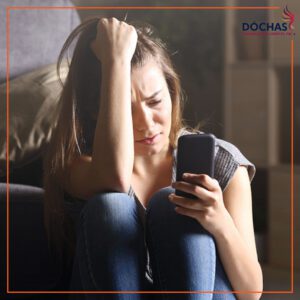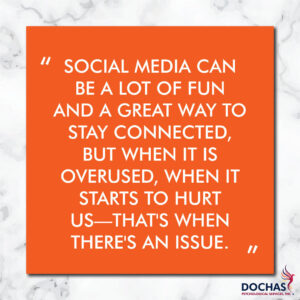Hi there! It’s Kim, back on the Dóchas blog. Ever wonder why social media gives us so much anxiety? That’s something I want to explore today.
It’s amazing how vast social media really is—for many of us, it’s how we stay connected with others or get our news. But we don’t really think too much about how social media could potentially be creating more anxiety, depression, or other issues in our lives. I came across this great article, “The Social Dilemma: Social Media and Your Mental Health,” which talks about the mental health issues that can arise from social media use, and shares some great strategies for using social media in a healthier way. But in this blog, I want to talk about WHY social media gives us anxiety. You can watch the video below, or just continue reading!
Social Media Rewards Our Brains
Social media is designed to target the brain’s reward center, which is the dopamine center of the brain. Dopamine is the feel-good chemical. Social media impacts dopamine in a very similar way that gambling does—there’s always the hint of a future reward.
For example, you don’t know how people are going to respond to a video you’re thinking of posting. Maybe you’ll get a lot of likes, or more followers or subscribers, and maybe it’ll be more popular than your last video. You don’t know for sure, but that possibility of positive reinforcement makes social media very much like gambling, like some sort of addiction.
So why does that create a problem? Because really, if it’s not creating an issue in your life then who cares if it’s addictive? After all, chocolate is addictive too! (No, I’m kidding.)
I gotta be honest right off the bat: I have a love-hate relationship with social media. I mean, I use it as part of my business, but I actually actively avoid it, and very much for the reasons that I’m going to share today. This is not a popular view, and it’s been hard. Not engaging in social media has left me feeling very disconnected from watching my nieces growing up and a lot of what’s going on in my friends’ lives. But I truly think that there are issues with boundaries in social media and it creates a lot of problems. But that is a personal opinion—this is not scientific, though I have seen social media issues come up with my clients. This is my personal relationship with social media. But there are some reasons why the addictiveness of social media is a problem for everyone.
There are at least three issues that come up when you use social media, and these issues explain why social media can make us feel anxious.
Using Social Media for Validation
When we start attaching popularity to sharing content and looking for validation through other people’s responses to us, online validation begins to replace other meaningful connections in our lives. So we distance ourselves from real life and stay in the social media world.
But people feel safe to comment whatever they want on social media because they don’t have to look that person in the face and say something hurtful. Instead, they can just type it on their keyboard.
So then when you look for validation through these sources and the response that you get is negative, it can increase depressive symptoms or cause more anxiety before you post the next time. But you still feel the need to post the next time because you need to see whether or not you’re accepted or validated. This is a big problem!
Fear of Missing Out
This leads us to the second issue, which is that fear of missing out, missing some sort of experience by not posting online. So you feel compelled to post even though it’s not necessarily always received well and you’re opening yourself up to rejection. This makes social media even harder to navigate.
Seeing Life Through a Filter
And then lastly, the other way that social media can increase anxiety or depressive symptoms is because everything is filtered. There are some really wicked awesome filters—and believe me, I’ve tried some of them, and they’re really cool! But there’s this distorted view of reality that we start to get from social media. It started when you’d carefully select which pictures you would post, but now there are all these filters, adjustments, and lighting things you can use to alter the images and make you look totally different than what you look like in real life.
Let’s be honest, we see these images and there’s no way we could ever live up to them. So it becomes this competition of how can I filter myself to look like I fit in? How can I make myself look like I’m accepted and I’m validated and I’m engaging in this experience? And yet at the same time in my real life, I know that’s not me. And so it’s a real denial of self and that hurts our souls.
Not only do we hear other people telling us that we are potentially not good enough or that we need to change something, but we start to tell that to ourselves. And as I’m sure you know, we are our own worst critics. So nobody could say anything to us that we probably haven’t said to ourselves at one point in time or another.
There is a huge vulnerability that comes with posting on social media that could really affect our mood, especially when we do it a lot.
Strategies for Managing Social Media
Let’s be real, social media isn’t going anywhere but it is possible to use it in a responsible and healthy way. Check out the article that I mentioned at the beginning of this blog (“The Social Dilemma: Social Media and Your Mental Health”)—it has some great strategies.
In the meantime, I just hope you love yourself for just who you are. You don’t have to be society’s perception of what is perfect because perfect is actually imperfect. What makes you uniquely you is so beautiful and so special, and so needed. If we were all the same, how boring would that be?
So just love you and everything about you because that is enough for anyone. And if anybody tells you, it’s not …they can get stuffed. Let’s leave it with that. Take care of yourself. As always if you have any questions or concerns, please don’t hesitate to reach out to me at info@dochaspsych.com. Bye for now!
~~
Key Takeaway:
Why does social media give us anxiety? 1.) We use it for our own validation, when it’s not a good tool for that. 2.) We experience fear-of-missing-out because of it. 3.) We use filters, causing us to notice the ways we don’t measure up to our filtered versions of ourselves.
~~
About Dóchas Psychological
Dóchas Psychological Services is a well-established and trusted therapy clinic located in Spruce Grove, Alberta. At Dóchas we value the idea that everyone deserves a safe space. Through connection and education, our team works hard to build a trustworthy relationship with each of our clients. It is our goal to create a community for our clients to feel like they belong.
Disclaimer
Information provided through Dóchas Psychological Services blogs or vlogs is meant for educational purposes only. They are NOT medical or mental health advice. You can read more about our disclaimer here.



